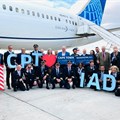South Africa’s post-Covid recovery in international tourism is under way but we’re not quite there yet. In trying to lure back big tourism spenders, is the industry losing sight of the value of local tourists?

Tijan Oberholzer, Director, Touch Down Group
South Africa’s fiscal crisis, in an environment of rising interest rates, soaring food, fuel and energy prices, plus high levels of unemployment, is likely to dominate the news cycle for years to come.
But while the focus is primarily on the cost of living, the travel and tourism sector is a powerful driving force for the economy, creating jobs, stimulating growth, upskilling and lifting communities out of poverty.
The latest UNWTO World Tourism Barometer shows global tourism is on route to a strong recovery: 2023 closed with tourism numbers up at 88% of pre-pandemic levels, with an estimated 1.3 billion international tourist arrivals. China’s reopening earlier last year had a marked impact, but the US boasts the largest travel and tourism sector in the world.
The World Travel & Tourism Council says with the remaining pent-up demand unleashed, increased air connectivity, and a stronger recovery of Asian markets and destinations, it expects international tourism to make a full recovery by the end of 2024 — despite the challenging economic backdrop and geopolitical tensions.
Stats SA’s tourism data for December shows most of our tourists came from the United Kingdom, the US and Germany, which brought in 41,106 (20%); 33,027 (16.1%) and 25,288 (12.3%) tourists respectively.
With direct flights between the US and South Africa, and the dollar on their side, the US market is a massive opportunity to ramp up our country’s travel and tourism sector.
It’s American tourists, a robust source market for Europe, the Americas, and the Middle East, who are driving tourism flows and spending around the world.
In South Africa, pre-Covid, the US market was our second-largest inbound market, recording 373,694 arrivals. They spent R7.8bn that year on tourism in this country: by 2022, that had risen by 6% to R8.3bn. While the UK brings in more tourists, Americans spend more on our shores. The reintroduction of direct flights between New York and Cape Town has reduced travel time for US visitors and will likely encourage more Americans to visit South Africa.
In the year to November 2023, South Africa welcomed more than a million visitors from Europe primarily from the UK, but also from Germany and the Netherlands, according to recent data from Stats SA. China, Singapore, India and Russia also account for a significant proportion of visitors.
Opportunity knocks
South Africa’s tourism sector is finally starting to approach pre-pandemic levels, although we have some way to go: StatsSA’s latest data shows our international arrivals are still 17.1% below the pre-pandemic levels and the December 2023 number (862 460) is 41.8% lower than the 1,481,183 recorded in 2019.
What this means for South Africa’s leisure and hospitality sector, whether focused on day trips, weekend retreats, business travel, or longer stays, is an immense opportunity.
While many tourism operators aim to attract international tourism, which is certainly lucrative and cannot be ignored, local tourists should be the cornerstone of their business. If Covid-19 showed us anything, it’s that local tourists should be our bread-and-butter: they kept the industry afloat during the pandemic and are a sustainable market.
Economic pressures, rising travel costs and inflation are resulting in a global shift towards more proximate destinations. In South Africa, plagued by a weak local currency, domestic tourism is likely to see an even bigger uptick in the next few years. There is no question that our citizens are eager to explore South Africa and are cognisant that there aren’t many countries where one can enjoy world-class facilities, gourmet cuisine and exceptional experiences at our prices.
The data reveals that the domestic tourism market is the fastest-growing sector. South Africans took 18.8 million domestic overnight trips in the first half of 2023, a 23.4% increase compared to the same period in 2022.
Affordable luxury
Thirty years of experience in the hospitality and leisure sector has taught us that providing affordable luxury for the average guest is a winning formula, helping to deliver high occupancy levels despite price sensitivity.
The local market wants tourism and hospitality properties that are easily accessible from major cities, so guests — whether families or MICE tourists (meetings, incentives, conferences, and exhibitions) - do not have to factor in flight costs or long road trips. Consumers are under more financial stress than ever before, turning over every cent, so they want bang for their buck.
While location and facilities are important, experiences are equally critical. So too is the hybrid business-leisure trend post the pandemic which requires that hospitality establishments can provide uninterrupted power and reliable Wi-Fi. The growth of remote working has led to the development of extended stay products which allow guests to take longer breaks without having to take leave. Investments in these products are becoming increasingly attractive for investors because they provide a healthy return.
What has become very apparent post the pandemic is that not only is the domestic tourism sector well-positioned for growth, but it’s also well-positioned to offer exceptional experiences that are a fraction of the cost of an international holiday. Quality tourism and hospitality products that are easily accessible and provide guests with an enticing experience are likely to flourish in the years ahead, doing much to boost local economies and alleviate unemployment in the process.


























![Today, Halo and Demographica announce a new specialist agency, Second Rodeo]], headed up by Mike Stopforth (left). Dean Oelschig, managing partner and founder of Halo (right) says they will work as a group but ultimately, each agency will be an individual specialist](https://biz-file.com/c/2505/772543-64x64.jpg?2)




